Filter by
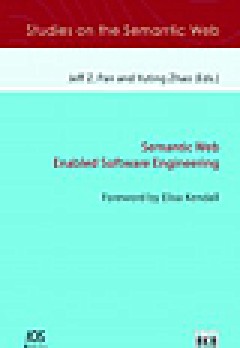
Semantic web enabled software engineering
Over the last decade, ontology has become an important modeling component in software engineering. Semantic Web Enabled Software Engineering presents some critical findings on opening a new direction of the research of Software Engineering, by exploiting Semantic Web technologies. Most of these findings are from selected papers from the Semantic Web Enabled Software Engineering (SWESE) seri…
- Edition
- -
- ISBN/ISSN
- 9781614993704
- Collation
- vi, 251 p.; 22 cm.
- Series Title
- -
- Call Number
- 005.1 SEM s
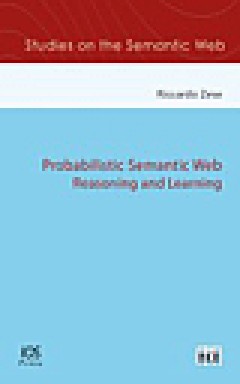
Probabilistic semantic web : reasoning and learning
The management of uncertainty in the Semantic Web is of foremost importance given the nature and origin of the available data. This book presents a probabilistic semantics for knowledge bases, DISPONTE, which is inspired by the distribution semantics of Probabilistic Logic Programming. The book also describes approaches for inference and learning. In particular, it discusses 3 reasoners and 2 l…
- Edition
- -
- ISBN/ISSN
- 9781614997344
- Collation
- vii, 161 p.; 22 cm.
- Series Title
- -
- Call Number
- 025.0427 ZES p

The evolution of grounded spatial language
This book presents groundbreaking robotic experiments on how and why spatial language evolves. It provides detailed explanations of the origins of spatial conceptualization strategies, spatial categories, landmark systems and spatial grammar by tracing the interplay of environmental conditions, communicative and cognitive pressures. The experiments discussed in this book go far beyond previous …
- Edition
- -
- ISBN/ISSN
- 9783946234142
- Collation
- X, 267 p.
- Series Title
- -
- Call Number
- 402.85 SPR e
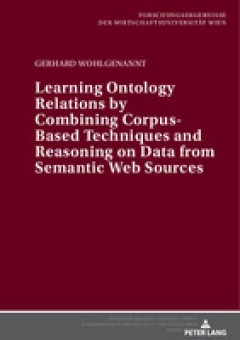
Learning ontology relations by combining corpus-based techniques and reasonin…
The manual construction of formal domain conceptualizations (ontologies) is labor-intensive. Ontology learning, by contrast, provides (semi-)automatic ontology generation from input data such as domain text. This thesis proposes a novel approach for learning labels of non-taxonomic ontology relations. It combines corpus-based techniques with reasoning on Semantic Web data. Corpus-based methods …
- Edition
- -
- ISBN/ISSN
- 9783631606513
- Collation
- 221 p.
- Series Title
- Forschungsergebnisse der Wirtschaftsuniversitaet Wien, 44
- Call Number
- 004.678 WOH l

Context-dependence, perspective and relativity
This volume brings together original papers by linguists and philosophers on the role of context and perspective in language and thought. Several contributions are concerned with the contextualism/relativism debate, which has loomed large in recent philosophical discussions. In a substantial introduction, the editors survey the field and map out the relevant issues and positions.
- Edition
- -
- ISBN/ISSN
- 9783110227772
- Collation
- 362 p.; 22 cm.
- Series Title
- Mouton series in pragmatics; 6
- Call Number
- 401.43 CON c

The semantic transparency of English compound nouns
What is semantic transparency, why is it important, and which factors play a role in its assessment? This work approaches these questions by investigating English compound nouns. The first part of the book gives an overview of semantic transparency in the analysis of compound nouns, discussing its role in models of morphological processing and differentiating it from related notions. After a ch…
- Edition
- -
- ISBN/ISSN
- 9783961100316
- Collation
- viii, 363 p.; 22 cm.
- Series Title
- -
- Call Number
- 401.43 SCH s
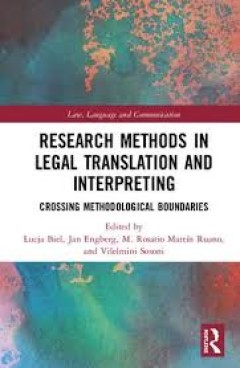
Research methods in legal translation and interpreting: crossing methodologic…
The field of legal translation and interpreting has strongly expanded over recent years. As it has developed into an independent branch of Translation Studies, this book advocates fora substantiated discussion of methods and methodology, as well as knowledge about the variety of approaches actually applied in the field. It is argued that, complex and multifaceted as it is, legal translation cal…
- Edition
- -
- ISBN/ISSN
- 9781351031226
- Collation
- 1 online resource.
- Series Title
- Law, language and communication
- Call Number
- 418.0334 BIE r
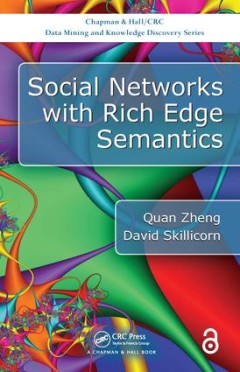
Social networks with rich edge semantics
Social Networks with Rich Edge Semantics introduces a new mechanism for representing social networks in which pairwise relationships can be drawn from a range of realistic possibilities, including different types of relationships, different strengths in the directions of a pair, positive and negative relationships, and relationships whose intensities change with time. For each possibility, the …
- Edition
- -
- ISBN/ISSN
- 9781315390628
- Collation
- xx, 210p. : ill.
- Series Title
- -
- Call Number
- 302.3015118 ZHE s
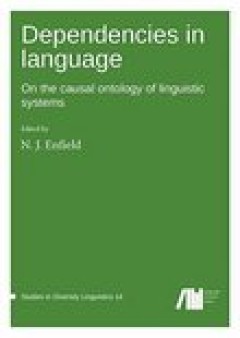
Dependencies in language: On the causal ontology of linguistic systems
Dependency is a fundamental concept in the analysis of linguistic systems. The many if-then statements offered in typology and grammar-writing imply a causally real notion of dependency that is central to the claim being made—usually with reference to widely varying timescales and types of processes. But despite the importance of the concept of dependency in our work, its nature is seldom def…
- Edition
- -
- ISBN/ISSN
- 9783946234661
- Collation
- 215 p.
- Series Title
- -
- Call Number
- 400 ENF d
 Computer Science, Information & General Works
Computer Science, Information & General Works  Philosophy & Psychology
Philosophy & Psychology  Religion
Religion  Social Sciences
Social Sciences  Language
Language  Pure Science
Pure Science  Applied Sciences
Applied Sciences  Art & Recreation
Art & Recreation  Literature
Literature  History & Geography
History & Geography